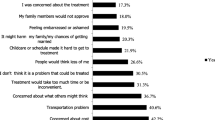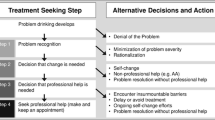Abstract
Background: This paper presents findings from the Australian National Survey of Mental Health and Wellbeing (NSMHWB) regarding prevalence and treatment seeking for Australians with DSM-IV alcohol dependence and examines the influence of alcohol use variables on treatment seeking. Method: A standardised interview (including CIDI 2.1) was administered to a stratified random sample of 10,641 Australians aged 18 years and over. Demographic variables, common DSM-IV mental disorders, physical health status, perceived disability and treatment-seeking behaviour were assessed. Multiple logistic regression was used to ascertain the independent effects of all variables considered. Results: The prevalence of DSM-IV alcohol dependence was 4.1 % in this population, with 75 % being male and nearly 60 % in the 18–34 year age group. Variables that correlated independently with alcohol dependence were sex (male), age (young), not being in a married or de facto relationship and having any affective, anxiety or other substance use disorder. Functional disability did not correlate with a dependence diagnosis. Correlates of treatment seeking for those with dependence were sex (female) and having a comorbid affective disorder. Having a diagnosis of dependence and/or abuse and having more dependence symptoms did not predict treatment seeking. However, meeting either of two criteria assessing psychological, physical or social problems due to alcohol use tended to increase service use. Conclusions: People with alcohol dependence do not perceive themselves as disabled and do not seek treatment. However, having a comorbid affective disorder or other problems directly attributable to alcohol use increases the likelihood that such individuals will seek treatment. Efforts should be made at the primary care level to encourage those engaged in harmful drinking practices to recognise the risks of such drinking and reduce it or seek treatment. Similarly, it is recommended that integrated services are enhanced at both primary and specialist levels in order that those with multiple problems are appropriately treated. Further research is required to refine measurement of disability and diagnoses of alcohol use disorders and to examine the relationship between disability and alcohol use.
Similar content being viewed by others
Author information
Authors and Affiliations
Additional information
Accepted: 29 April 2002
Rights and permissions
About this article
Cite this article
Proudfoot, H., Teesson, M. Who seeks treatment for alcohol dependence?. Soc Psychiatry Psychiatr Epidemiol 37, 451–456 (2002). https://doi.org/10.1007/s00127-002-0576-1
Published:
Issue Date:
DOI: https://doi.org/10.1007/s00127-002-0576-1




